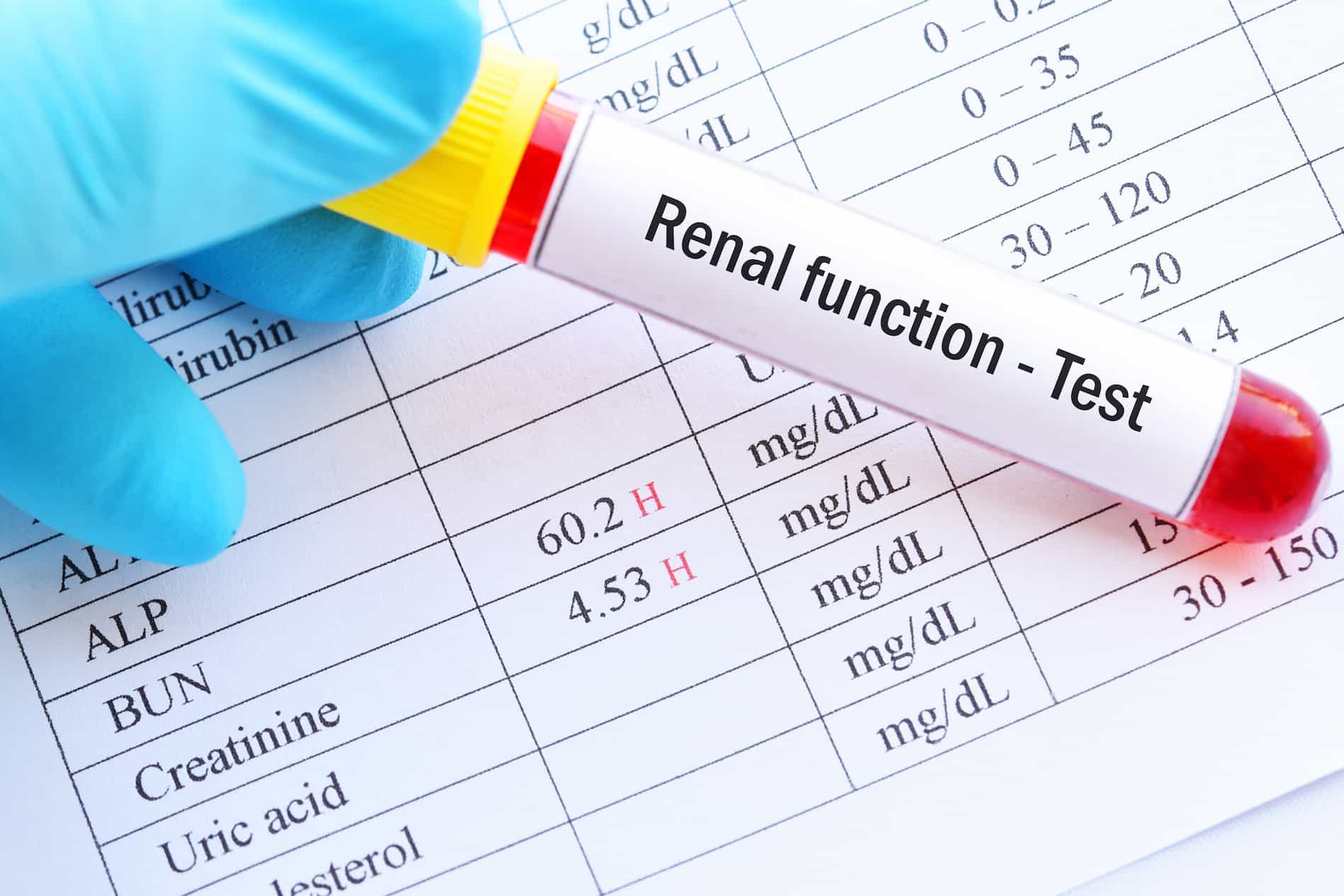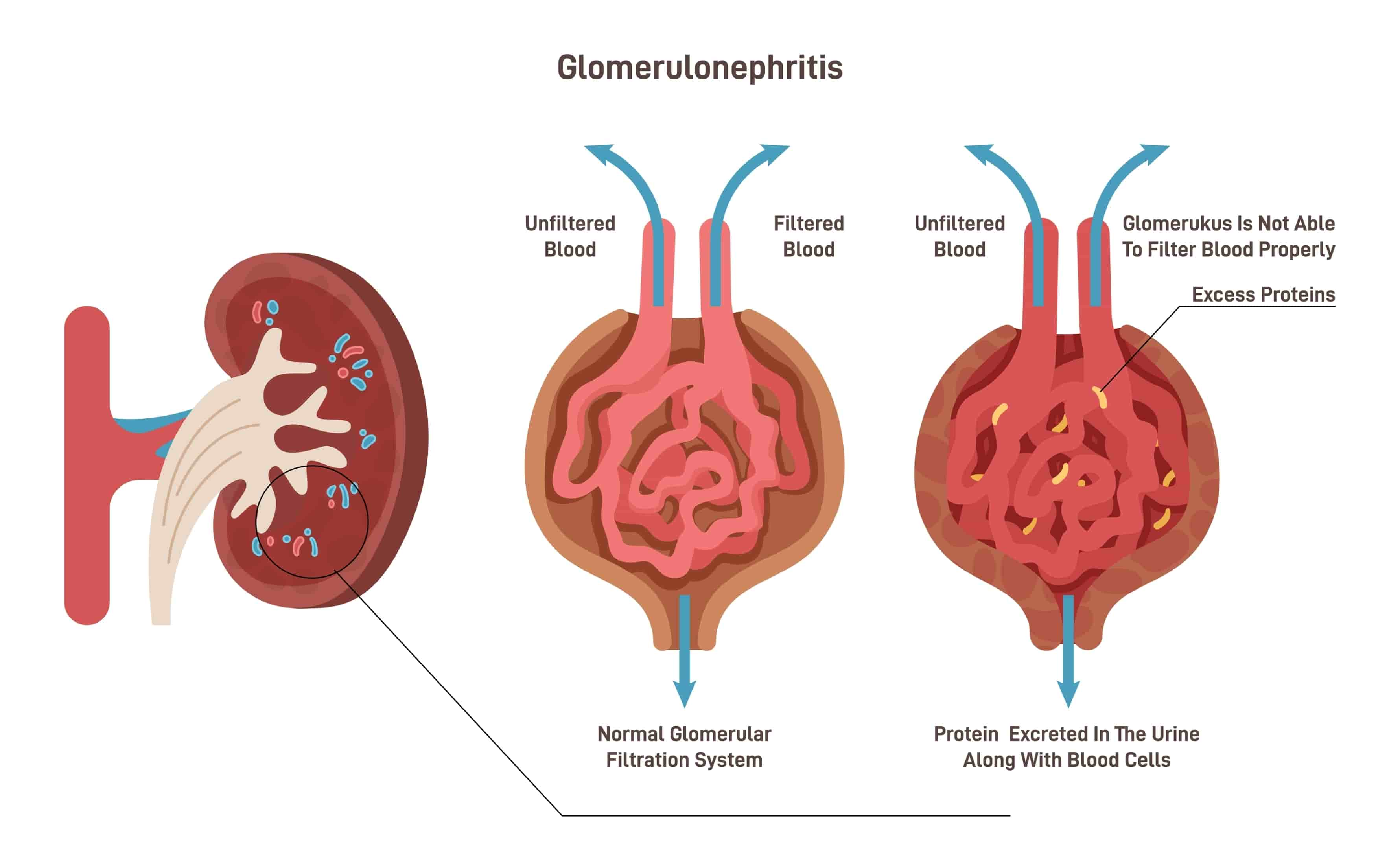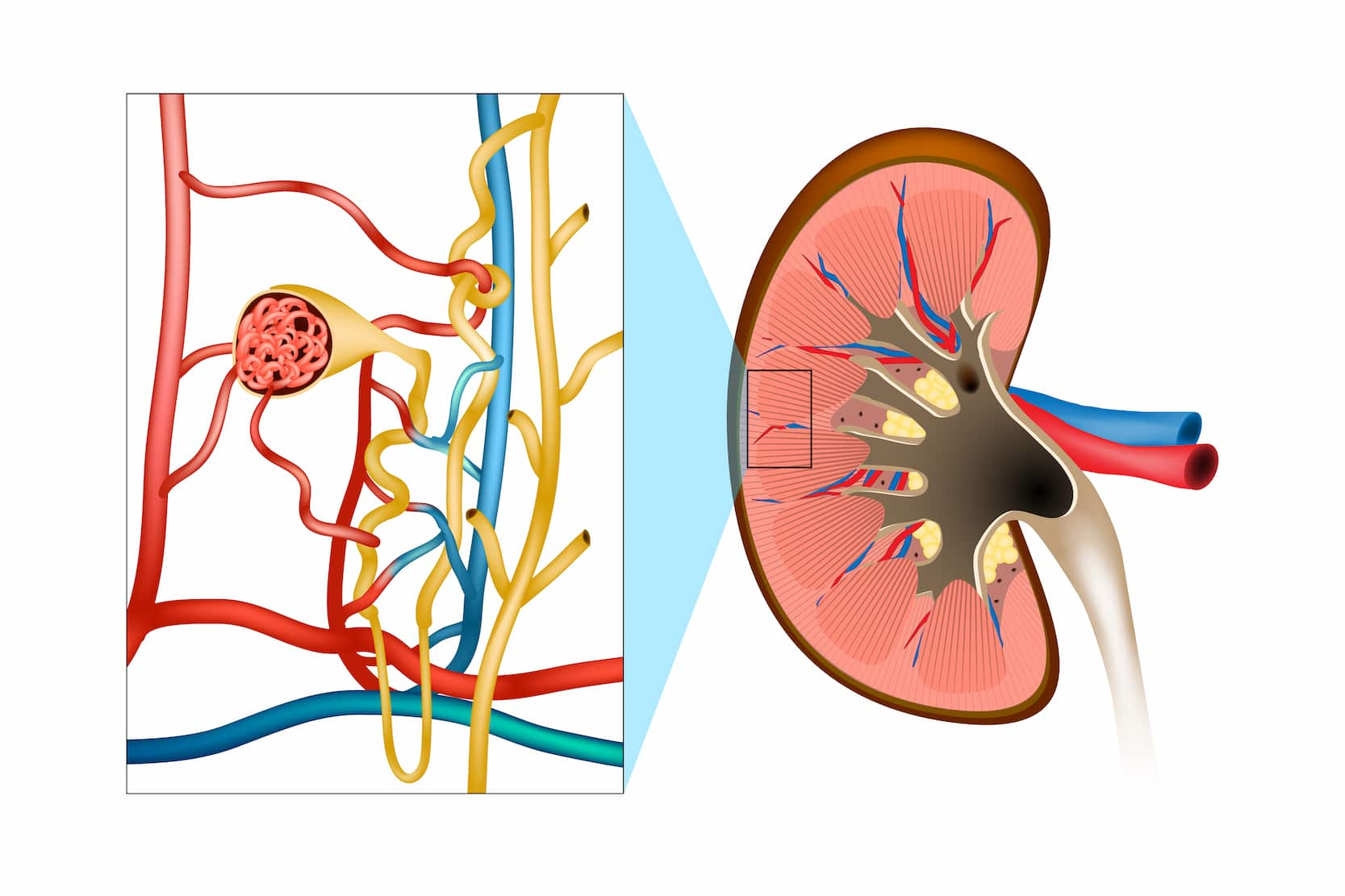Treatment of Glomerular Diseases in Turkey
Healthy Türkiye helps you find the best treatment of glomerular diseases in Turkey at affordable prices and adopts a 360-degree service approach in all areas of health through affiliated hospitals.
- Homepage
- Medical Treatment
- Treatment of Glomerular Diseases in Turkey

About Treatment of Glomerular Diseases in Turkey
The treatment of glomerular diseases in Turkey is for a kidney issue that impairs the kidney’s capacity to maintain a balance of specific compounds in the bloodstream. The kidneys are bean-shaped and roughly fist-sized bodily organs. On each side of the body, they are positioned slightly below the rib cage. Toxins are generally removed from the bloodstream by the kidneys and excreted in the urine, whereas proteins and red blood cells remain in the bloodstream.
They utilize nephrons, which are small structures that filter the blood supply of the body. A glomerulus filters waste and excess fluids, while a tubule changes the waste into the urine in each nephron. Toxins may be retained in the bloodstream when a person has the glomerular disease, although red blood cells and proteins may be eliminated in the urine. This disease can progress on its own by affecting only the kidneys. It can also be linked to underlying medical disorders like diabetes, lupus, or infections that affect other organ systems.
The two most common kinds of glomerular disease are nephritic and nephrotic. However, the two categories can occasionally overlap. Hematuria, or blood in the urine, is the most prevalent symptom of nephritic illness. A person with glomerulonephritis may be asymptomatic in moderate cases, with no major impairment of kidney function or proteinuria. Proteinuria, or protein in the urine, is the most prevalent nephrotic symptom. Kidney function may deteriorate as the nephrotic syndrome advances. If you have symptoms of glomerular disease, your doctor will conduct various tests to identify glomerular disease.
Urine examinations: If the glomeruli are damaged or inflamed, urine analysis may reveal red blood cells, white blood cells, or elevated protein levels.
Blood tests: These are used to determine the levels of creatinine and blood urea nitrogen, which rise when the kidneys are damaged and not filtering adequately.
Imaging examinations: When glomerular disease is suspected, the most commonly ordered imaging test is a kidney ultrasound. It is done primarily to rule out other possible causes of impaired kidney function or blood in the urine.
Kidney biopsy: In patients who cannot be diagnosed with blood tests or imaging tests alone, a kidney biopsy may be required to confirm the source of glomerular disease.
The start of glomerular disease can be rapid (referred to as acute), or it can grow gradually over time. The treatment of glomerular disease is determined by its cause and type. Improvement may be seen while the infection is treated, depending on this. However, management is sometimes the only choice. This is critical to preventing future kidney injury.

Procedure of Glomerular Diseases in Turkey
Treatment of glomerular disease in Turkey is to stop the damage to the glomeruli, which are the filtering units in your kidney. Foamy pee, pink urine, elevated blood pressure, and edema in your face, hands, ankles or feet are all symptoms. A variety of disorders can lead to glomerular disease. Diabetes-related nephropathy is the primary cause. Treatments are determined by the underlying cause. The goal is to avoid or delay renal injury.
The kidneys, which are two bean-shaped organs located to the left and right of your spine immediately below the rib cage, are your body’s primary filters. The arteries carry blood to your kidneys. The arteries branch inside your kidneys, and blood flows into a network of tiny looping blood channels known as glomeruli. Each glomerulus is connected to the opening of a tubule, which is a tiny fluid-collecting tube. Each glomerulus-tubule unit is referred to as a nephron. Each kidney has around one million nephrons.
Glomeruli that are properly functioning keep blood cells and proteins flowing in the bloodstream, where they are needed by your body. Meanwhile, glomeruli filter waste items and excess water before passing them into the tubule (which becomes urine). Pee exits the kidneys via bigger tubes known as ureters, which convey the urine to the bladder.
A variety of disorders can lead to glomerular disease. The goal of treatment is to address the underlying cause (if one can be identified) in order to protect your kidneys from additional damage. Here are several general disease categories that can cause glomerular disease, as well as examples and therapies for each.
Autoimmune conditions: These are diseases in which your immune system attacks your own body. These disorders might affect your entire body or only certain organs or regions of it.
Hereditary nephropathy is a genetic condition that causes chronic glomerular disease as well as hearing or vision loss. Both men and women are affected. Men are more likely to have chronic renal disease, which can be diagnosed in their twenties, with total kidney failure happening by the age of 40. Medication to control blood pressure is one of the treatments.
Waste materials will accumulate if your kidneys are unable to remove them from your blood. This buildup can harm your kidneys and cause them to fail. Function loss can be acute (rapid) or gradual and continuing (chronic). Renal function can be lost in a matter of days or weeks, depending on the kind of glomerular disease, or it might be lost gradually over the decades.

We Care About Your Health
Healthy Türkiye provides the best for your health and comfort. You will feel privileged with us.
7/24 Quality Personal Assistance Throughout Your Journey
Customizable for You All-Inclusive Packages
Get the Right Advice for your Health
How Is Treatment of Glomerular Diseases Performed in Turkey?
For the treatment of glomerular disease in Turkey, your healthcare professional will need to identify what is causing your illness. The goals of treatment are to alleviate your symptoms, avoid complications, and reduce the progression of kidney impairment. Sometimes you may require medication or interim treatment with an artificial kidney machine to drain extra fluid, manage high blood pressure and treat renal failure. There is no single treatment that works for all glomerular disorders, although your doctor may advise you to:
Control your blood pressure and prevent protein loss in the urine using ACE inhibitors or ARBs.
To address edema in the ankles and feet, take diuretics (water tablets).
Make dietary modifications, such as eating less salt.
Take drugs that suppress your immune system (for example, corticosteroids)
The intensity of accompanying signs and symptoms, as well as the type (acute or chronic), determine the management of glomerular disease. Some types of glomerular disease, such as infection-related glomerular disease, improve after the infection is treated.
Other types of glomerular illness may necessitate the use of immune-suppressing drugs, such as glucocorticoids (commonly called steroids). Cyclophosphamide (trade name: Cytoxan), rituximab (trade name: Rituxan), azathioprine (trade names: Azasan, Imuran), or mycophenolate mofetil (trade name: Cellcept) may also be used. Plasmapheresis, a treatment to filter the blood and remove substances that may be causing the inflammation, is sometimes used to treat rapidly progressing glomerulonephritis. Some types of glomerular disease might not require treatment, whereas others do.
Managing high blood pressure is critical to preventing further kidney damage; one or more drugs may be required. For patients with chronic glomerular disease, one or more high-blood pressure drugs may be used to reduce the amount of protein in the urine and halt the course of kidney disease.
Types of Treatment of Glomerular Diseases in Turkey
Glomerular illness decreases the kidneys’ ability to maintain a balance of specific compounds in the bloodstream. Toxins are normally removed from the bloodstream by the kidneys and excreted in the urine, but red blood cells and proteins remain in the bloodstream. Red blood cells and proteins may be eliminated in the urine by people with glomerular disease, but toxins may be retained.
Treatment of glomerular diseases in Turkey is focused on illnesses that can occur on their own (i.e., solely affect the kidney) or in conjunction with another medical condition that affects other organ systems, such as lupus, diabetes, or certain infections. Glomerular illness can appear suddenly (“acute” glomerular disease) or gradually over time (“chronic” glomerular disease). The treatment of glomerular disease is determined by its cause and type.
One of the kidney’s most critical duties is to filter waste from your blood using a million small filters called glomeruli. A glomerulus acts a little bit like a kitchen colander, allowing debris and water to flow through to generate urine. Usually, blood will not travel through the “holes” in the colander and instead return to your body. But if you have a kidney illness that affects your glomeruli, which we call glomerular disease, blood will pass through the holes and enter your urine.
Glomerular disorders can range from moderate to severe and include several diseases that cause renal function loss. It is critical to diagnose the glomerular disease early and precisely. Timely therapy is crucial to avert renal failure. Treatment may include:
Diet adjustments and exercise.
Controlling blood pressure with medicine.
Medicine to suppress the immune system.
Glomerular disease is a prevalent cause of chronic renal disease. The most common cause of the glomerular disease is diabetic kidney disease. Autoimmune diseases, infections, medications, and hereditary kidney problems are less prevalent causes. A kidney biopsy is frequently needed to detect non-diabetic glomerular disease.
Ways to Keep Your Kidneys Healthy
Kidney disease affects 33% of people in the United States. That’s 1 in 3 people. Kidney illness is a serious public health issue. Kidney disease sometimes goes unnoticed until it is well advanced. Unfortunately, this is the point at which someone would require dialysis or a transplant. The idea is to detect renal illness before it causes problems. Regular testing for everyone is vital, but it is especially important for those at risk. Follow these steps to learn more about kidney disease, your risk, and how to prevent it:
Don’t Overdo Certain Medications
Take Care of Your Salt
Avoid Taking Herbal Supplements
Eat Healthily
Diabetes and high blood pressure are the two most frequent kidney diseases. A balanced diet and frequent exercise can help keep both under control. With diabetes, it’s also crucial to keep a constant check on your blood sugar and take insulin when you need it. Check your blood pressure levels on a regular basis, and take any medications exactly as prescribed by your doctor.
Why Are the Kidneys Important?
Your kidneys eliminate wastes and surplus fluid from your body. Your kidneys also eliminate acid created by your body’s cells and keep a healthy balance of water, salts, and minerals in your blood, such as sodium, calcium, phosphorus, and potassium. Without this equilibrium, your nerves, muscles, and other tissues may not function normally. Your kidneys also produce hormones that aid with digestion:
Control your blood pressure
Make red blood cells
Keep your bones strong and healthy
Each nephron includes a filter, termed the glomerulus, and a tubule. The nephrons filter your blood in two steps: the glomerulus filters it, and the tubule returns the required chemicals to your blood while removing wastes.

2026 Cost of Treatment of Glomerular Diseases in Turkey
All types of medical attention, like the treatment of glomerular diseases, are very affordable in Turkey. Many factors are also included in determining the cost of treatment of glomerular diseases in Turkey. Your process with Healthy Türkiye will last from the time you decide to have treatment for glomerular diseases in Turkey until the time you are fully recovered, even if you are back home. The exact treatment cost of glomerular disease procedures in Turkey depends on the type of operation involved.
The cost of treatment of glomerular diseases in Turkey does not demonstrate many variations in 2026. Compared to costs in developed countries like the United States or the UK, treatment of glomerular diseases costs in Turkey is relatively low. So, it’s no wonder patients from across the world visit Turkey for treatment of glomerular diseases. However, price is not the only factor affecting choices. We suggest looking for hospitals that are safe and have treatment of glomerular diseases reviews on Google. When people decide to seek medical help for the treatment of glomerular diseases, they will not only have low-cost procedures in Turkey, but also the safest and best treatment.
At clinics or hospitals contracted with Healthy Türkiye, patients will receive the best treatment for glomerular diseases from specialist doctors in Turkey at affordable rates. Healthy Türkiye teams provide medical attention, treatment of glomerular diseases, procedures, and high-quality treatment to patients at a minimum cost. When you contact Healthy Türkiye assistants, you can get free information about the cost of treatment of glomerular diseases in Turkey and what this cost covers.
Why Is the Treatment of Glomerular Diseases Cheaper in Turkey?
One of the main considerations before traveling abroad for treatment of glomerular diseases is the cost-effectiveness of the whole process. Many patients think that when they add flight tickets and hotel expenses to their treatment of glomerular diseases, it will become very expensive to travel, which is not true. Contrary to popular belief, round-trip flight tickets to Turkey for treatment of glomerular diseases can be booked very affordably. In this case, assuming you are staying in Turkey for your treatment of glomerular diseases, your total travel expense of flight tickets and accommodation will only cost less than any other developed country, which is nothing compared to the amount that you are saving.
The question “Why is the treatment of glomerular diseases cheaper in Turkey?” is so common among patients or people simply curious about getting their medical treatment in Turkey. When it comes to the treatment of glomerular diseases, there are 3 factors that allow for cheaper prices in Turkey:
The currency exchange is favorable for whoever looking for the treatment of glomerular diseases has a euro, dollar, or pound;
The lower cost of living and cheaper overall medical expenses, such as treatment of glomerular diseases;
For the treatment of glomerular diseases, incentives are given by the Turkish Government to medical clinics working with international clients;
All these factors allow for cheaper treatment of glomerular diseases, but let’s be clear, these prices are cheaper for people with strong currencies (as we said, the euro, dollar, Canadian dollar, pound, etc.).
Every year, thousands of patients from all over the world come to Turkey to get treatment for glomerular diseases. The success of the healthcare system has increased in recent years, especially in the treatment of glomerular diseases. It’s easy to find well-educated and English-speaking medical professionals in Turkey for all kinds of medical treatment such as the treatment of glomerular diseases.

Why Choose Turkey for Treatment of Glomerular Diseases?
Turkey is a common choice among international patients seeking advanced treatment of glomerular diseases. Turkey’s health procedures are safe and effective operations with a high success rate in the treatment of glomerular diseases. The increasing demand for high-quality treatment of glomerular diseases at affordable prices has made Turkey a popular medical travel destination. In Turkey, treatment of glomerular diseases is performed by highly experienced and trained doctors with the most advanced technology in the world. treatment of glomerular diseases is done in Istanbul, Ankara, Antalya, and other major cities. The reasons for choosing the treatment of glomerular diseases in Turkey are as follows:
High-quality hospitals: Joint Commission International (JCI) accredited hospitals have dedicated treatment of glomerular disease units that are specially designed for patients. International and national strict protocols provide effective and successful treatment of glomerular diseases for patients in Turkey.
Qualified experts: The expert teams include nurses and specialist doctors, together to carry out the treatment of glomerular diseases according to the patient’s needs. All the included doctors are highly experienced in performing the treatment of glomerular diseases.
Affordable price: The cost of treatment of glomerular diseases in Turkey is affordable compared to Europe, the USA, the UK, Singapore, Australia, etc.
The high success rate: Highly experienced specialists, the best available technology, and stringently followed safety guidelines for post-operative care of the patient, resulting in a high success rate for the treatment of glomerular diseases in Turkey.
Is Treatment of Glomerular Diseases Safe in Turkey?
Did you know Turkey is one of the most visited destinations for the treatment of glomerular diseases in the world? It is ranked as one of the most visited tourist destinations for the treatment of glomerular diseases. Over the years, it has also come to be a very popular medical tourism destination, with many tourists coming in for treatment of glomerular diseases. There are so many reasons why Turkey stands out as a leading destination for the treatment of glomerular diseases. Because Turkey is both safe and easy to travel to, with a regional airport hub and flight connections to pretty much everywhere, it is preferred for the treatment of glomerular diseases.
The best hospitals in Turkey have experienced medical staff and specialists who have performed thousands of medical services, such as the treatment of glomerular diseases. All procedures and coordination related to the treatment of glomerular diseases are controlled by the Ministry of Health in accordance with the law. Over many years, the greatest progress in medicine has been observed in the field of the treatment of glomerular diseases. Turkey is known among foreign patients for its great opportunities in the area of treatment of glomerular diseases.
To emphasize, besides the price itself, the key factor in selecting a destination for the treatment of glomerular diseases is certainly the standard of medical services, the hospital staff’s high expertise, hospitality, and the safety of the country.
All-Inclusive Packages for Treatment of Glomerular Diseases in Turkey
Healthy Türkiye offers all-inclusive packages for the treatment of glomerular diseases in Turkey at much lower prices. Extremely professional and experienced doctors and technicians carry out the high-quality treatment of glomerular diseases. The cost of treatment of glomerular diseases in European countries can be quite expensive, especially in the UK. Healthy Türkiye provides cheap all-inclusive packages for a long and short stay of treatment of glomerular diseases in Turkey. Because of many factors, we can provide you with many opportunities for your treatment of glomerular diseases in Turkey.
The price of treatment of glomerular diseases differs from other countries due to medical fees, staff labor prices, exchange rates, and market competition. You can save much more in treatment of glomerular diseases compared to other countries in Turkey. When you purchase treatment of glomerular diseases all-inclusive package with Healthy Türkiye our healthcare team will present of hotels for you to choose from. In treatment of glomerular diseases travel, you will have the price of your stay included in the all-inclusive package cost.
In Turkey, when you purchase treatment of glomerular diseases all-inclusive packages through Healthy Türkiye, you will always receive VIP transfers. These are provided by Healthy Türkiye, which is contracted with highly qualified hospitals for the treatment of glomerular diseases in Turkey. Healthy Türkiye teams will organize everything about the treatment of glomerular diseases for you and have you picked up from the airport and safely brought to your accommodation. Once settled in the hotel, you will be transferred to and from the clinic or hospital for the treatment of glomerular diseases. After your treatment of glomerular disease has been successfully completed, the transfer team will return you to the airport in time for your flight home. In Turkey, all packages of treatment for glomerular diseases can be arranged upon request, which relaxes the minds of our patients.
The Best Hospitals in Turkey for Treatment Of Glomerular Diseases
The best hospitals in Turkey for treatment of glomerular diseases are Healthy Türkiye, Memorial Hospital, Acıbadem International Hospital, and Medicalpark Hospital. These hospitals attract patients from all over the world seeking treatment of glomerular diseases due to their affordable prices and high success rates.
Best Doctors and Surgeons in Turkey for Treatment Of Glomerular Diseases
The best doctors and surgeons in Turkey for treatment of glomerular diseases are highly skilled professionals who offer specialized care and advanced procedures. With their expertise and state-of-the-art techniques, these specialists ensure that patients receive high-quality treatment of glomerular diseases and achieve optimal health results.

Frequently Asked Questions
Immunosuppressive medications and plasmapheresis, a blood-cleaning technique that eliminates autoantibodies, are among the treatments. IgA nephropathy is a type of glomerular illness caused by immunoglobulin A (IgA) deposits in the glomeruli, causing inflammation.
Dialysis is used to treat acute renal failure caused by infection-related glomerulonephritis. Dialysis uses a device that operates like an artificial, external kidney that filters your blood. End-stage kidney disease is a type of chronic kidney disease that can only be treated with dialysis or a kidney transplant.
Fruit: apples, cranberries, grapes, pineapple, and strawberries. Vegetables: cauliflower, lettuce, onions, peppers, and radishes.
Egg whites are a high-quality, protein-rich source of protein. Plus, they’re a fantastic alternative for patients undergoing dialysis therapy, who have higher protein needs but need to restrict phosphorus.
Some high-protein foods, such as red meat, poultry, and fish, can put a lot of stress on your kidneys. They contain a lot of purines, which might raise the level of uric acid in your blood. This can lead to gout or kidney stones.
